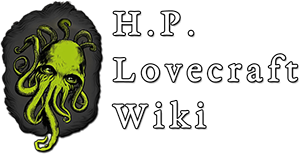![]()
![]() France is a country in Europe whose colonialism and cultural heritage have spread its language and influence across the globe. The nation features in the fiction of H. P. Lovecraft and in other Cthulhu Mythos writers, particularly the Averoigne stories of Clark Ashton Smith.
France is a country in Europe whose colonialism and cultural heritage have spread its language and influence across the globe. The nation features in the fiction of H. P. Lovecraft and in other Cthulhu Mythos writers, particularly the Averoigne stories of Clark Ashton Smith.
French history traces back to 507, when the Merovingian dynasty of Franks took over the province of Gaul from the collapsing Roman Empire. The Frankish King Clovis I made his capital at Paris in 508, which has ever since been the center of France's political and cultural life.
France established itself as one of the great powers of Europe, under leaders from Charlemagne to Napoleon. It seized colonies in Canada, Louisiana, the Caribbean, West Africa, and Southeast Asia, among other places. France's regicidal revolution of 1789, with its ideals of liberty, equality, and fraternity, was an inspiration to many and a warning to others around the world.
France had a bitter rivalry with England that lasted centuries, but found itself on the side of Britain in two world wars. (For Americans of Lovecraft's generation, "France" could be used synonymously with the "Great War", or World War I.) In the post-World War II world, France has maintained a sometimes contentious alliance with the United States.
French Weird Literature[]
Lovecraft praises several French writers in his survey of Supernatural Horror in Literature, though noting that France has produced relatively few great writers who focused on specifically supernatural horror. Thus both Victor Hugo and Balzac are said to "employ supernaturalism...generally only as a means to some more human end, and without the sincere and daemonic intensity which characterises the born artist in shadows." Gustave Flaubert "but for a strong realistic bias might have been an arch-weaver of tapestried terrors."
Lovecraft credits "the powerful and cynical Guy de Maupassant" with "suggesting with marvellous force the imminence of nameless terrors, and the relentless dogging of an ill-starred individual by hideous and menacing representatives of the outer blackness." But Lovecraft suggest these are more "the morbid outpourings of a realistic mind in a pathological state than the healthy imaginative products of a vision naturally disposed toward phantasy and sensitive to the normal illusions of the unseen."
Lovecraft says of the Symbolist and Decadent schools that their "dark interests really centre more in abnormalities of human thought and instinct than in the actual supernatural." The writing team Erckmann-Chatrian create "a shuddering midnight atmosphere...despite a tendency toward natural explanations and scientific wonders." Writers like Villiers de l’Isle-Adam and Maurice Level are devoted to "the so-called conte cruel, in which the wrenching of the emotions is accomplished through dramatic tantalisations, frustrations, and gruesome physical horrors.
In short, argues Lovecraft, "the French genius is more naturally suited to this dark realism than to the suggestion of the unseen; since the latter process requires, for its best and most sympathetic development on a large scale, the inherent mysticism of the Northern mind." He does, however, aknowledge Théophile Gautier as displaying "an authentic French sense of the unreal world."
In Lovecraft's Fiction[]
The most important appearance of France in Lovecraft's fiction never mentions the name "France", but it's evident that the Rue d'Auseil in "The Music of Erich Zann" is meant to be located in that country; the narrator notes that Erich Zann writes in "the laboured French of a foreigner." It's generally assumed that the unnamed city in the story is Paris.[1]
"The Silver Key" establishes that during World War I, Randolph Carter "served from the first in the Foreign Legion of France." "Through the Gates of the Silver Key" elaborates: Carter and the New Orleans mystic Etienne-Laurent de Marigny met "when they both served in the French Foreign Legion," and were drawn together by "similar tastes and outlook." The story notes that while on furlough,
| “ | the learned young Creole had taken the wistful Boston dreamer to Bayonne, in the south of France, and had shewn him certain terrible secrets in the nighted and immemorial crypts that burrow beneath that brooding, aeon-weighted city.... | „ |
Charles Dexter Ward, in the novel that bears his name, makes research trips to the Bibliothèque Nationale in Paris when he is investigating the revivification of Joseph Curwen. Ward then keeps an address on the Rue St. Jacques while undertaking "a special search among rare manuscripts in the library of an unnamed private collector." (Rue St. Jacques is a street in Paris's Latin Quarter, near the Sorbonne; it was a major thoroughfare in medieval Paris.)[2]
It's noted in "The Call of Cthulhu" that "a fantastic painter named Ardois-Bonnot [hung] a blasphemous 'Dream Landscape' in the Paris spring salon of 1926."
Averoigne[]
- Main article: Averoigne
Clark Ashton Smith set a series of short stories in fictional French province of Averoigne, loosely based on the historical province of Auvergne in France's Central Massif. The northern half of the territory is dominated by the walled city of Vyônes, site of an impressive cathedral. In the southern half is located the town of Ximes. In the forest can be found haunted ruins, such as the Chateau des Faussesflammes and the stronghold of Ylourgne.
References[]
- ↑ An H. P. Lovecraft Encyclopedia, "Music of Erich Zann, The", S. T. Joshi and David E. Schultz (Hippocampus Press, 1994).
- ↑ Wikipedia, "Rue Saint-Jacques, Paris".
